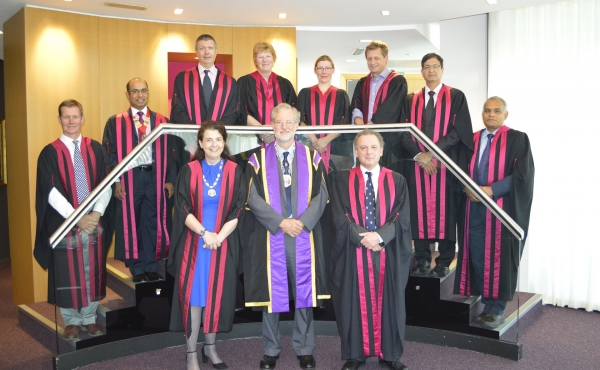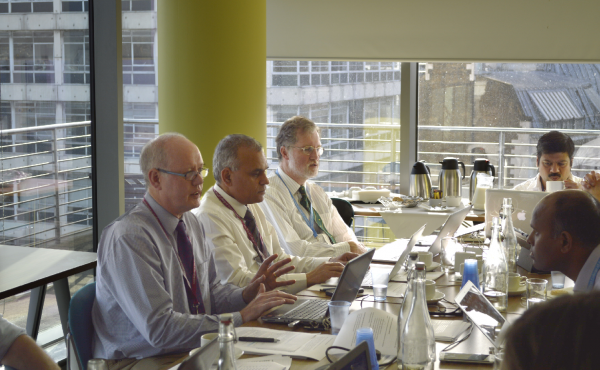FPM Board Elections
There are no current vacancies on the Faculty Board
Voting has now closed for the FPM Board elections. Future vacancies will be advertised on this page.
FPM Board Election 2024 results
We received three applications for two vacancies on the Board. Voting for the election closed on Wednesday 21st August at 12PM. The results have been confirmed and independently verified and two candidates have been duly elected. Thank you to everyone who took the time to vote.
We are pleased to announce that Dr Manohar Sharma has been re-elected for a second term and that Dr Vivek Mehta has been elected for his first term. Their terms will start on 7th March 2024.
The Faculty would like to thank all candidates for standing and for their continuing support and work with the Faculty.
The table of results can be found below and a full breakdown of the election results is available.
| Candidate | Votes | |
|---|---|---|
| Dr Manohar Sharma | 163 | Elected |
| Dr Vivek Mehta | 151 | Elected |
| Dr Devjit Srivastava | 127 | |
| Abstain | 25 |
Candidates' election statements
(seeking a second term)
The Walton Centre NHS Foundation Trust, Liverpool
nominated by Dr John Wiles and Dr Sanjeeva Gupta
Q1: What experience do you have in local, regional and national committees, projects and initiatives?
I have been in a Consultant Post since 2004 and full-time in Pain Medicine since 2011. I have a clinical profile within the MDT setup delivering complex cancer, pelvic, facial, and spinal pain. My skills include pain neuromodulation implants, neuroablation including cordotomy, spinal neurolysis, trigeminal ganglion interventions, and spinal radiofrequency techniques combined with general pain management principles.
I have been an FFPMRCA Examiner, FPM Educational meetings adviser (over 6 years), and The British Pain Society Interventional Pain SIG Chair to promote collaboration and pain education relevant to day-to-day practice. I have led several pain educational events for FPM and in Liverpool including the Annual Chronic Pain Course and EFIC Cancer Pain School over the last 15 years.
I co-founded the North England Pain Medicine Group in 2009 to support pain education, regional networking, and promoting areas of good clinical practice and this group is still active.
I co-steered NIHR NERVE’S multicentre RCT comparing discectomy with transforaminal epidural steroid injections for acute sciatica published in Lancet Rheumatology in 2021 demonstrating epidural steroid injections to reduce the need for surgery and treatment cost.
While being co-opted to the Professional Standards Committee, I have shown initiative to be Vice-Chair and was recently appointed PSC Chair. I am an FPM Board member and contributed as a Clinical Editor for FPM Transmitter from 2019 to 2023.
Q2: What would you aim to do if elected to the Board?
I am confident that I will be able to lead and support FPM initiatives including the third edition of FPM Core Standards for Pain Management Services, ACSA for Pain, and Pain Credentials, and constructive views on various consultations sent to FPM as these impact Pain Medicine Standards and influence our clinical practice and thus are relevant to FPM members and the future of our subspecialty.
St Bartholomew's Hospital, London
nominated by Dr Ganesan Baranidharan and Dr Sarah Love-Jones
Q1: What experience do you have in local, regional and national committees, projects and initiatives?
I am a Consultant in Pain Medicine and Neuromodulation and Director of Pain Research at St Bartholomew's Hospital, London. If elected to serve the FPM Board I would bring a strong academic and educational portfolio with more than 25 years clinical experience in Pain Medicine.
I have been appointed as the Chair of Royal Court of Examiners for Fellowship of Faculty of Pain Medicine and serve on the board of National Neuromodulation Society of UK and Ireland as elected honorary Treasurer. I am the Co- Director for the University PG Certificate Program and EEPIN in Neuromodulation, the only university-based accreditation in the field of neuromodulation.
Q2: What would you aim to do if elected to the Board?
- Quality standards in pain management necessitate that pain services should be staffed by appropriately trained individuals who work within multidisciplinary teams and that interventional procedures should not be performed in isolation, but as part of a holistic package of care. This would need succession planning and identifying the workforce for future.
- Credentialing in pain will create an opportunity making it a truly multidimensional specialty and to have allied specialties taking the FFPM exam for accreditation. With my role as the Chair of FFPM Exam, I would ensure that the exam matches the proposed structural changes.
- Global reach of FFPM Exam: The success of online delivery in pandemic has given an opportunity to expand the exam globally, and it would be worth piloting the FFPM exam in overseas market with strong pain academia.
- Ensuring the equality and diversity with appropriate gender representation in pain medicine in UK.
Board member Responsibilities
Excerpt from the Regulations of the Faculty of Pain Medicine (Part IX)
1 Attending meetings. Members are expected to attend all meetings. Members who consistently fail to attend meetings without prior leave may be removed from the Board by the Dean. Members will also be expected to attend other major functions of the Faculty such as the Annual Meeting for Fellows and Members.
2 Delegates. Members may not send delegates to attend in their place unless agreed by the Chair or the Dean.
3 Confidentiality. Members of the Board should observe total confidentiality with respect to any discussions or papers considered confidential or sensitive, except where disclosure has been formally permitted.
4 Disclosure of interests
4.1 General conflicts of interest. Before applying for the Board, members are expected to consider whether any current roles they hold would compromise the performance of their duties for the Faculty. For example, it would be expected that Board members would not hold full roles on the Boards or Councils of similar organisations or societies. This could pose both a conflict of interest and, in conjunctions with Regulation VI:7, is likely to affect the individual’s capacity to take forward Faculty activities.
4.2 For individual areas. All Members should disclose to the Chairman any relevant conflicting interest of any kind (financial or otherwise) arising in relation to any item on the agenda. Where a relevant interest has been disclosed, the member may, subject to the Chairman’s agreement, remain during and participate in any debate on the item concerned, but must not vote.
5 Members may be:
a. appointed to Faculty Committees or working groups;
b. required to commit to events (either chairing or presenting);
c. required to become the Responsible Officer for a consultation process;
d. asked to represent the Faculty on external bodies;
e. asked to contribute to the written material of the Faculty.
6 It is recommended that Members discuss their appointment with hospital colleagues and senior management.
7 Resignations
7.1 A member of the Board may tender their resignation at any time prior to the completion of their term of office. The resignation will not take effect until accepted by the Board.
7.2 Any member of the Board who ceases the clinical practice of Pain Medicine would normally demit office from the Board at the next election.
Want to know more?
Meet the current members of our Faculty Board.



